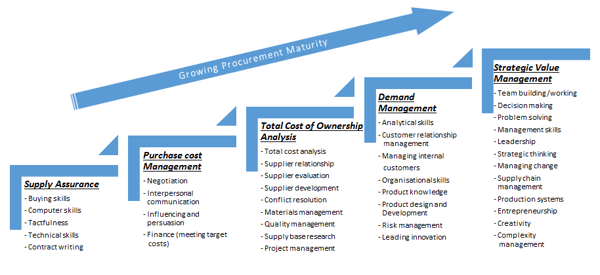/LPSBlogImage17.jpg?width=615&height=361&name=LPSBlogImage17.jpg)
The procurement profession plays an increasingly strategic role in organisations. Today, procurement professionals are involved in a wider range of business processes, and have a higher level of contribution to the organisation’s strategic decisions. Their performance is also monitored more closely by the top management.
Procurement professionals make crucial decisions influencing the whole organisation.
These decisions apply to an extensive range of activities and several business areas (e.g. demand forecasting, warehouse location, transport mode, truck loading, information flow, inventories, and production). They are also linked to external processes and relationships with suppliers and customers. This arrangement needs professionals to coordinate processes that are not necessarily within their direct control. They are typically expected to look after relationships with various sections within their company (e.g. sales and marketing, human resources, and finance). This may involve understanding and dealing with people in different levels and positions including senior executives, buyers, accountants, operational workers, quality inspectors, and product engineers.
In view of this, today’s procurement professionals should be in a position to increase the stakeholders’ values with a broader view, which is not limited only to transaction cost reduction. This reflects how procurement has been evolving from supply assurance, to purchase cost management, total cost of ownership analysis, demand management, and ultimately strategic value management.
The Strategic role of Procurement
The more strategic role of procurement demands a new talent pool containing knowledge of and skills in supplier relationship management, negotiation and contracting, network structure management, supplier performance management, and product and process development. Finding the right talent to oversee pivotal procurement responsibilities requires a thorough understanding of the capabilities necessary to lead modern procurement processes.
The figure below summarises our recent research outcomes, and illustrates the expanding portfolio of procurement talent while the profession is evolving currently and in the near future.

The long list of required skills and capabilities for procurement necessitates a rigorous process for talent management. Accordingly, procurement talent management should:
- understand how human resources can affect procurement and supply chain outcomes
- discover critical future capabilities for procurement talent development and management purposes
- identify the enhanced ways that procurement can provide value to the organisation and supply chain as a whole
- analyse the antecedents and consequences of procurement managerial performance.
Through this process, procurement professionals are transformed to an intelligent client who knows and defines what the organisation needs in terms of quality, price, delivery, specification, and after-sale services, and is also knowledgeable of supply markets their dynamics.


/LPSBlogImage17.jpg)
